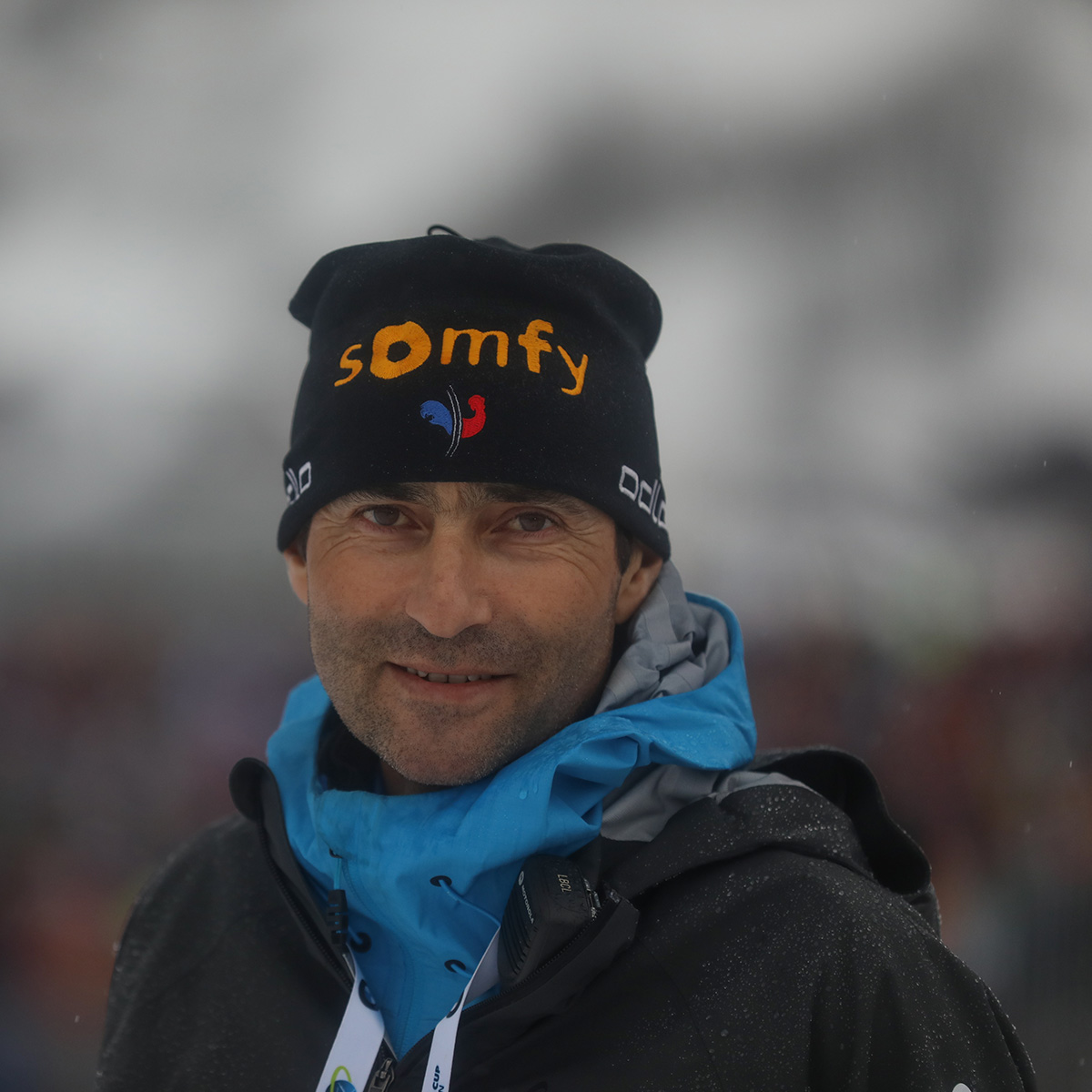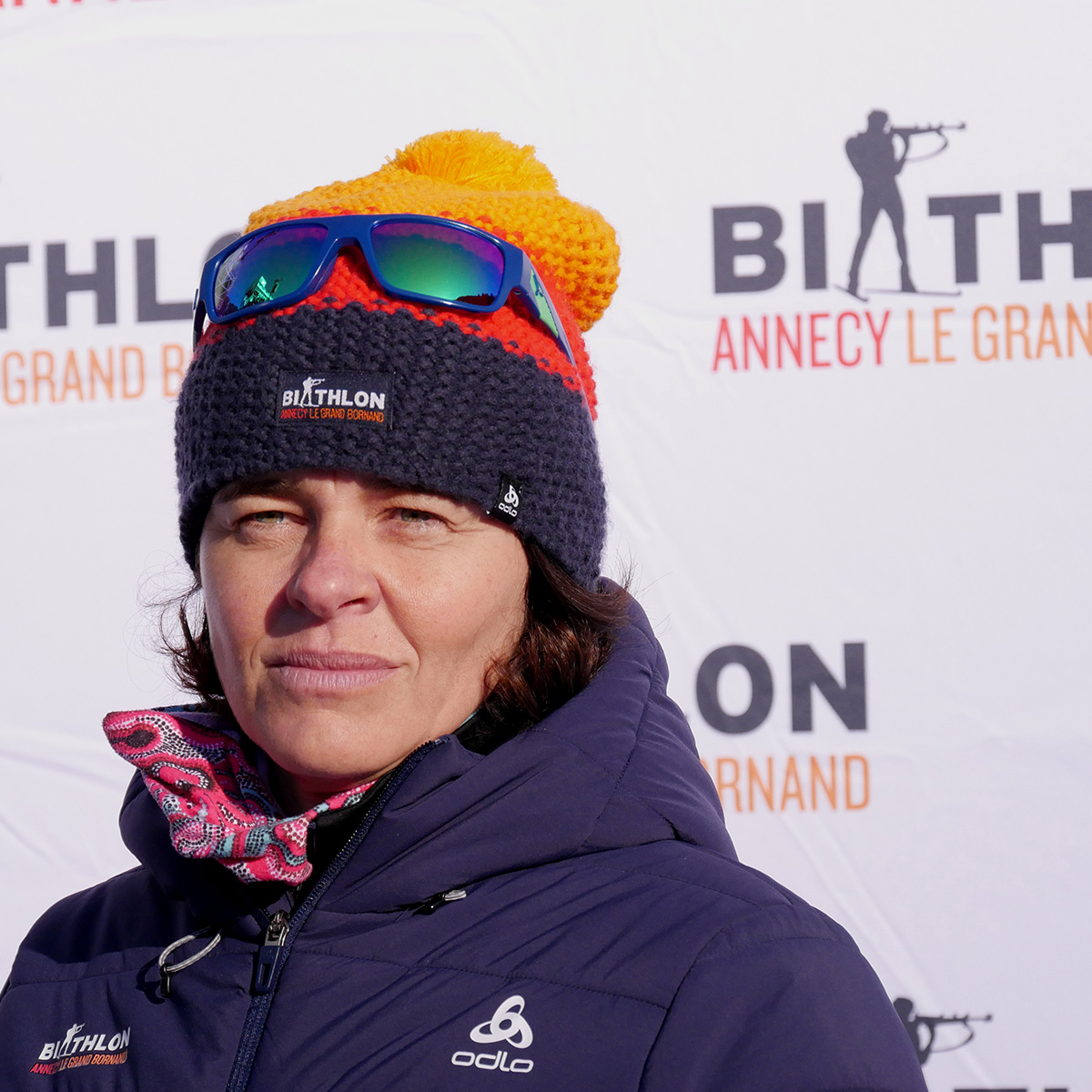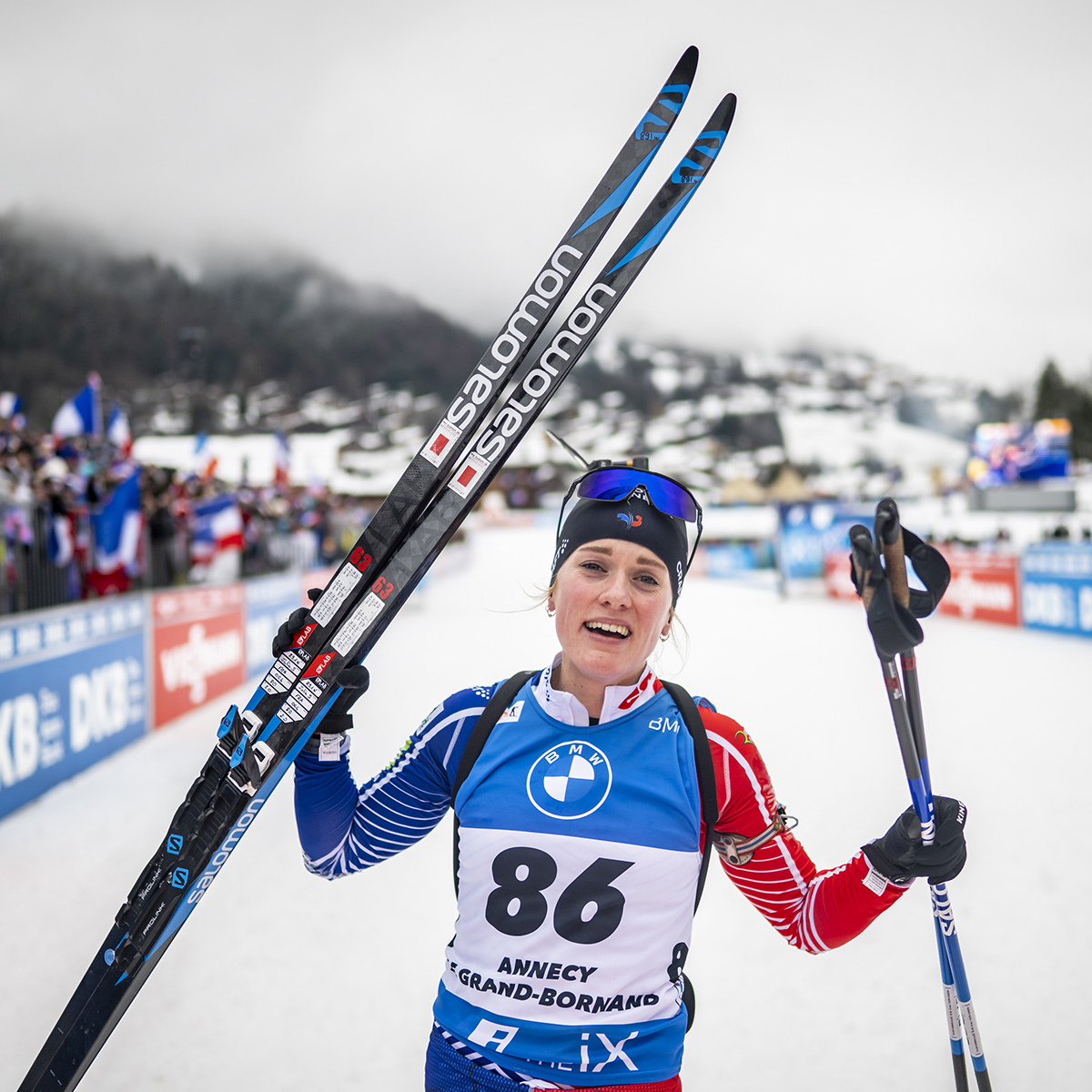A sport with military origins
In 1924 in Chamonix, during the first Winter Olympic Games, a demonstration of Nordic patrol was organised, but until the end of the Second World War, biathlon remained an exclusively military sport.


In 1924 in Chamonix, during the first Winter Olympic Games, a demonstration of Nordic patrol was organised, but until the end of the Second World War, biathlon remained an exclusively military sport.
Long before it became an Olympic sport that thrills crowds, biathlon was certainly one of the oldest activities practised by the peoples of the Far North… who travelled on skis with a bow on their backs to hunt. There are even traces of these skier-archers in Scandinavian mythology. Over the centuries, the practice developed for both warfare and hunting purposes.
In 1958, however, the first world championships were held in Seefeld, Austria. Governed by the IUPMB, the international federation that oversaw modern pentathlon and biathlon, biathlon became an Olympic sport in 1960 in Squaw Valley in the United States. Initially, Eastern European and Scandinavian countries, whose battalions had been practising this difficult art assiduously for a long time, dominated the competitions.
Over the years, other countries have taken an interest and, today, the balance of power has shifted considerably.
Until 1972, military weapons were used, which made the discipline restrictive and limited its practice. The advent of the .22 long rifle was the first major development. The independence of biathlon under the banner of the IBU (International Biathlon Union) in 1993 enabled the discipline to take an important turn. This new autonomy led to a major shift with the emergence of new competition formats that thrill the public and attract numerous partners, particularly in terms of audience numbers. The spectacular nature of the races boosts television audiences and attracts thousands of spectators to the main World Cup events.
This is the era of pioneers. A time when everything is being built. For the most daring, biathlon is the oldest ‘sport’ in human history, inspired by prehistoric hunters who travelled on pieces of wood in search of game.
Initially, it was a military practice, training for soldiers in mountain battalions, forced to fight in harsh conditions.
Military patrol. This is what the event included in the 1924 Olympic Games programme was called before becoming a demonstration sport until 1948. It is contested by teams of four, who set off together with each competitor taking turns at the shooting range.
André Vandelle, Gabriel and Maurice Mandrillon and Georges Berthet won the bronze medal, but the discipline, practised with a heavy military rifle, which was both noisy and dangerous, struggled to attract popularity.
Popular in Eastern European countries, where high-level sport is effectively supported by the army, and in Scandinavia, it took shape in the 1950s with the first World Championships in 1958 and, two years later, its inclusion in the Olympic programme at Squaw Valley.
The road was long and difficult for two decades for the French biathlon team, often made up of cross-country skiers ‘relegated’ to biathlon, who owed their survival solely to the support of the army and customs authorities.
Without resources or structure, hampered by the heavy burden of war that impeded training logistics, French biathlon gradually climbed the ranks with Daniel Claudon’s first successes in the 1970s, followed by the arrival of Yvon Mougel.
Yvon Mougel, a sturdy man from the Bresse region of the Vosges, has seen it all in French biathlon. The years of hardship, at the bottom of the class, finishing last in his first junior world championships in 1972. The slow progress, step by step, with Sandona, Gruet Masson, Arpin and Claudon, pioneers of a discipline that was still finding its feet. The transition from military weapons to 22 long rifles. The first podium finishes in the fledgling World Cup in 1979 and the first medal at the World Championships in 1981 in Lahti, Finland.
A third place in the sprint, 4 seconds from victory, united French biathlon, which now knew it could climb onto the podium.
Led by David Moretti, a strapping lad from Vercors who firmly laid the foundations of rigour and seriousness for the French team for some fifteen years,
Yvon Mougel, flag bearer for the French delegation at the 1984 Olympic Games in Sarajevo, another first for biathlon, came close to an Olympic medal in the 20 kilometres, finishing fourth. A frozen index finger and a bullet that missed by a hair’s breadth meant he failed to make the podium. ‘I laid the foundations for the building,’ he said.
Competitive skiing has been part of Le Grand Bornand’s DNA since the early 20th century. Competitive Nordic skiing, particularly cross-country skiing, developed in the 1960s, when Nordic disciplines came out of obscurity thanks to the 1968 Olympic Games in Grenoble.
The rise of biathlon in France, with the awarding of the 1992 Olympic Games to Albertville, contributed to its development in clubs and resorts in the Alps.
In the early 1990s, Le Grand Bornand was awarded the organisation of the Alpen Cup, a competition bringing together the best young athletes and B teams from the leading nations, the forerunner of the IBU Cup, which has become the stepping stone to the World Cup. This is how the generation of Christophe Vassalo, the local champion, Patrice Bailly-Salins, Stéphane Bouthiaux, Gilles Marguet and Corinne Niogret were able to compete in their first international competitions on French snow in the Bouchet Valley.
This is the story of a French team that started with very little and rose to the top. In the 1980s, women’s biathlon began with the first world championships in Chamonix in 1984.
The early days were chaotic, with little support from the federation and under the critical and sarcastic gaze of a very male-dominated world.
The pioneers believed in it. They were tenacious and passionate. In 1988, Marie-Pierre Baby took to the podium at the World Cup in Anterselva. Véronique Claudel made a name for herself among the elite, often the only woman in the French men’s team on the international circuit, ‘to the point of once being forgotten in Minsk when it was time to leave,’ she recalls.
The awarding of the Olympic Games to France in 1986 gave them the means to achieve their ambitions. A group, led by Francis Mougel, a pillar of the French team for the decade, was formed around Véronique Claudel and a few other athletes. Corinne Niogret, not yet 20, Anne Briand, a cross-country skier who had left the French team, and a veterinary student who discovered biathlon when she helped out the French women’s team in the Universiade relay in Bansko, Bulgaria, in 1989, progressed and discovered the joys of competing for podium places in individual and relay events.
On 14 February 1992, at the Les Saisies stadium, in front of a joyful and enthusiastic crowd, Corinne, Véronique and Anne put in three outstanding performances and won the Olympic relay, a first in the history of biathlon. Triumphant and delighted to have opened the doors wide for those who have since won all over the biathlon world.
Until 1993, biathlon was managed by the International Modern Pentathlon and Biathlon Union. The combination of a summer discipline and a winter sport caused complications that hindered their development. This split allowed biathlon to reinvent itself with the gradual emergence of new race formats such as pursuit and mass start, which were more exciting, more spectacular and easier for the general public to understand. The European Championships were also created, and the organisation of the first edition was entrusted to Le Grand Bornand, rewarded for its dedication to organising events since the 1980s.
It was a success, crowned by superb results from the French team, which had sent its Olympic champions Anne Briand and Corinne Niogret.
Les Bleus finished at the top of the medal table with six medals, including a victory for Corinne Niogret in the sprint.
But what will be remembered most is the sprint victory of a 21-year-old hopeful: Raphaël Poirée, joined on the second step of the podium by Gilles Marguet.
The young man from Drôme, who had been double junior world champion a year earlier, had been disappointed at not being selected for the senior world championships scheduled a few weeks after the Grand Bornand stage. His response was this success, amid great collective euphoria, heralding a superb career and the beginnings of wonderful moments shared by biathlon enthusiasts on the slopes of Le Grand Bornand.
Sylvie Becaert grew up in Le Grand Bornand. She learnt to ski there, and the colours of the Ski Club became second nature to her. As a cross-country skier, she did not reach the top step of the podium at the World Cup, and in 1997 she added a rifle to her skiing equipment.
Under the guidance of national coach Pascal Etienne, she learned quickly and well, becoming one of the key players in the relay team. 2003 was her most successful season. ‘I prepared for the season alone, outside the group,’ she says. ‘I understood what I had to do.’
Throughout the season, she competed at the forefront of the World Cup and racked up points in the overall standings.
In March, the World Championships took place in Kanthy-Mansiisk, deep in Siberia, bringing the season to a close. “I had slipped a pair of “rock” skis into my bag. The kind of skis you sometimes use at the start of the season so as not to damage your best skis. They hadn’t been used all winter. That’s what I used for the sprint. ”
Sylvie skied the race as if in a dream. In the final, she caught up with Bulgaria’s Dafovska, the World Cup leader, who was three bibs ahead of her.
At the age of 28, Sylvie Becaert became world sprint champion and earned enough points to also win the overall World Cup ranking in the discipline. Gold + crystal: the perfect season.
After a successful 2003 season, Sylvie Becaert went through some difficult times and never regained her previous level in individual events.
Suffering from compartment syndrome, an infection that occurs during exercise due to swelling of an overworked muscle, she fought, as always, to keep up despite the pain and remained a pillar of the French relay team.
On 23 February 2006, at the San Sicario site, a stone’s throw from France, Delphine Peretto, Florence Baverel, who had previously won the sprint, Sylvie Becaert and Sandrine Bailly, after a courageous race, won the bronze medal in the relay at the Turin Olympic Games.
The day before, Roddy Darragon, silver medallist in the cross-country skiing sprint, had won the first Olympic medal in the history of the Grand Bornand Ski Club.
Four years later, in Vancouver, just before retiring, Sylvie Becaert, this time teamed up with Marie-Laure Brunet, Marie Dorin and Sandrine Bailly, added silver to her collection, which includes five world medals, two of which are gold, and two Olympic medals.
8,000 people gathered in the Bouchet Valley on 1 April 2007 for the French Championships, the traditional finale to the biathlon season. The mass start became a major event because Raphaël Poirée, an icon of the discipline, eight-time world champion, four-time winner of the overall World Cup ranking and victorious 44 times in his World Cup career, and Florence Baverel, Olympic sprint champion in Turin in 2006, were competing in the last race of their careers.
In a joyful atmosphere, the two champions, motivated and focused, made it a point of honour to finish with one last success before hanging up their rifles for good.
Despite the outstanding results achieved by its athletes since the 1990s, France has not organised many major biathlon events during this period, with the exception of the Olympic Games in 1992, the European Championships in Le Grand Bornand in 1995 and the Junior World Championships in Haute Maurienne in 2004. The French Ski Federation intends to remedy this situation, aware of the impact a World Cup would have on the popularity of the sport. Métabief, Bessans, Autrans, Chamonix and Le Grand-Bornand are all candidates. After a careful review of the applications on the recommendation of the IBU, Le Grand-Bornand is chosen on 24 November 2007. The IBU approved the French bid and the French Ski Federation entrusted Annecy-Le Grand-Bornand with the organisation of an IBU Cup final in 2011 and two World Cup rounds in December 2013 and 2017.
The IBU Cup is the second division of international biathlon. It is a high-level circuit where the champions of tomorrow rub shoulders with those who, in search of performance, ‘come down’ to hone their skills at a lower level. The races are always fierce, where every bullet and every second can have an impact on the season.
In March 2011, Le Grand Bornand, the biathlon venue for Annecy’s 2018 Olympic bid, hosted the IBU Cup finals, a dress rehearsal before joining the World Cup calendar. At the Sylvie Becaert stadium, in the heart of the village, the competitions are intense and the atmosphere euphoric. A good omen for what would become the ‘Monaco Grand Prix of biathlon’.
In 2011, Annecy was awarded the organisation of the 2013 Military World Winter Games. This is a major event for military sport, with a thousand participants from 40 countries. For French skiers, who owe so much to the army over the decades, with Martin Fourcade as squadron leader, ambitions are high.
The cross-country skiing and biathlon events took place in the Bouchet Valley. Facing very strong opposition, the French troops won 12 medals.
From 12 to 15 December 2013, Le Grand-Bornand hosted its very first Biathlon World Cup event. This was also a first for a French resort. No fewer than 140 journalists were accredited to report on the exploits of 200 biathletes from 32 different countries. In total, nearly 30,000 spectators gathered at the Sylvie Becaert stadium over four days and cheered on the early exploits of a certain Johannes Boe. Still a junior, the Norwegian won the first races of his career and stole the show from the French team led by Martin Fourcade, then double holder of the big crystal globe.
Following Justine Braisaz-Bouchet’s victory, Martin Fourcade followed suit and won the mass start in a frenzied Sylvie Becaert Stadium. After stumbling once again against Johannes Boe in the sprint and pursuit, the six-time Olympic champion took his revenge and proved untouchable. Unstoppable on the track, he was flawless on the shooting range, achieving a perfect 20/20 and celebrating with a furious fist pump. ‘It’s the biggest memory of my World Cup career because there was enormous pressure, enormous expectations,’ recalls the seven-time winner of the big crystal globe. ‘That day, I was able to win where people expected me to.’ In front of his home crowd.
Le Grand-Bornand often takes on a Norwegian accent, and the 2019 edition is no exception to the rule. Led by an armada guided by its leaders Johannes Boe and Tiril Eckhoff, Norway leaves only crumbs for the competition and achieves an almost perfect week with five wins out of a possible six. First victorious in the sprint, then in the pursuit, the 29-year-old biathlete had a dream week in the Haute-Savoie resort, also dominating the mass start. Accustomed to standing on the top step of the podium, Boe continued his winning streak by winning the pursuit and the mass start (his fifth and sixth victories in Haute-Savoie) and is already within touching distance of a second consecutive crystal globe ahead of Martin Fourcade.
The anomaly has finally been rectified. While Norway had made Le Grand-Bornand its favourite resort, dominating the podiums, France took spectacular revenge in 2021. Led by the dynamic duo of Quentin Fillon Maillet and Emilien Jacquelin, who were at the top of the World Cup rankings just one year after the retirement of their historic leader Martin Fourcade, the French team enjoyed a string of successes. Fillon Maillet won the pursuit before Jacquelin followed suit the next day in the mass start, stealing the yellow leader’s bib in the process. Julia Simon, second in the pursuit and mass start, and Anaïs Bescond, third in the sprint, gave the 60,000 spectators who had made the trip over the four days a real treat.
In another world. In their world. Norway crushed the male competition at the Grand-Bornand stage in 2022. The figures are staggering: eight podium places out of a possible nine, thanks in particular to its leader Johannes Boe, untouchable since the start of winter, and his runner-up Sturla Holm Laegreid, under the spell of the Aravis. “It’s always special to race here. The atmosphere is unique, the crowd cheers us on. Sometimes it feels like we’re competing at home, we feel so supported,” he said in the wake of his success in the pursuit. Velkommen til Le Grand Bornand!
Emotions ran high throughout the event. While Julia Simon, who had already come second in the pursuit the day before, and Anaïs Chevalier-Bouchet secured places on the podium in the mass start, the crowd at the Sylvie Becaert stadium had eyes only for their local hero. At 23, Sophie Chauveau is making a name for herself on home turf. Like Antonin Guigonnat five years earlier, the Bornandine native is racking up the podium finishes: fourth in the sprint in only her fifth World Cup start, eighth in the pursuit and sixth in the mass start. ‘I was afraid of being overwhelmed and consumed by the noise, but in the end it was quite the opposite,’ she admitted after joining the ranks of the greats.
Éric Perrot in second place, Émilien Jacquelin in third: in the men’s event, the French team savoured the crumbs left behind by the giant Johannes Boe, who once again shone at Le Grand-Bornand. It was a resounding comeback for Perrot, two years after being overwhelmed by the fervour of the French crowd and passing through the Haute-Savoie stage like a shadow. It was a return to the forefront for Jacquelin who, after months of ups and downs, rediscovered his natural attacking instinct, much to the delight of the spectators. ‘I love racing for the connection,’ he said. ‘The crowd gave me energy. That connection makes this podium very special.’
After nearly fifteen years on the world circuit, Johannes and Tarjei Boe bid farewell in style at Le Grand-Bornand. A few weeks before their retirement at the ages of 31 and 36, the two Norwegian brothers shone in Haute-Savoie. Second in the sprint, Johannes Boe put in yet another masterclass in the pursuit to claim the 88th of his 91 World Cup victories. The next day, his older brother, winner of the overall World Cup in 2011, took spectacular revenge. After being eliminated in the sprint and pursuit, Tarjei Boe triumphed in the mass start and shared the podium with his brother Johannes, who finished third. It was the last dance for a duo that has left its mark on biathlon and Le Grand-Bornand.

He is a key figure in the sporting landscape. Christophe Vassallo wears many hats, all united under the banner of a single passion: biathlon. A biathlete at a time when the sport was far from enjoying its current popularity, he hung up his rifle but remained on the circuit. The Bornandin native quickly became a coach, then national coordinator, enjoying passing on the art of his sport. In 2006, he took over as head of the technical office of the International Biathlon Union (IBU). The Haute-Savoie native then became the patient architect of the reform of the formats, making them shorter and more spectacular. He is the unsung hero of a sport that has now become a global spectacle.

She never sought the limelight, but her talent did it for her. Sylvie Becaert is the remarkable story of a woman born in Lille in 1975 but adopted by the Aravis mountains. A destiny with skis on her feet and a rifle on her back that she would write in gold letters: world sprint champion in 2003, then mixed relay champion six years later, the Bornandine native would also add two Olympic medals and a small crystal globe to her impressive list of achievements. So it was only natural that when she decided to retire in 2010, the resort decided a few months later to name its international stadium after her. ‘It’s a real honour,’ she admits. ‘My life is here. Even today, seeing the World Cup and the athletes – especially the French ones – perform on my home turf is always a special feeling.’

She is a child of Le Grand-Bornand. A biathlete who trained with the local Ski Club before revealing herself to the world one afternoon in December 2022. At home. In only her fifth World Cup start. The Haute-Savoie native was close to the podium in the sprint, carried by the cheers of her fans. She had a fabulous week, finishing in the top three in the pursuit and mass start, proving that she is now a force to be reckoned with. Since then, the 25-year-old biathlete has continued on her path, with two World Cup podium finishes to her name.

This anecdote perfectly sums up his character. In January 2021, when it came to choosing their flag bearer for the Beijing Games, the Paralympic athletes put forward one name and one name only: Benjamin Daviet. Daviet is more than just a member of the French team, he is its big brother. A triple Paralympic champion in cross-country skiing and biathlon at PyeongChang, the Haute-Savoie native added two more gold medals at the 2022 Games, completing an impressive list of achievements that also includes nine world titles and 37 World Cup victories. Always on the lookout for new challenges, the man whose destiny was changed by a moped accident when he was 17 dreamed of competing in the 2024 Summer Paralympics. Mission accomplished: Daviet finished 5th in the rowing final in Paris.